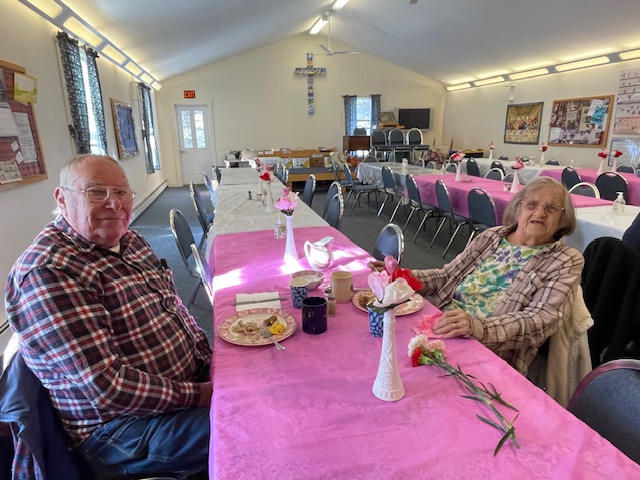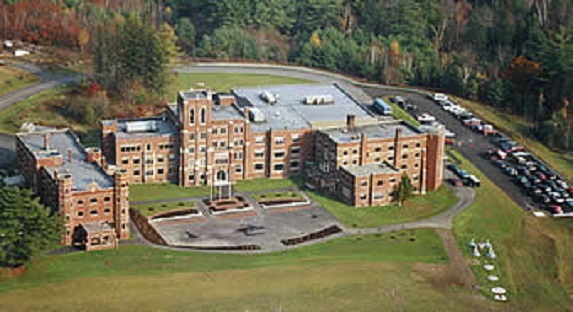
Foye School House, in North Palermo
Note: parts of this article were previously published in the Oct. 7, 2021, issue of The Town Line.
The Town of Palermo’s first settlers arrived around 1776 or 1777. By 1778 the area was called Great Pond Settlement, because, Milton Dowe explained in his 1954 history, it was “near the Sheepscot Great Pond,” now 1,193-acre Sheepscot Lake (the third largest in Waldo County, according to state data last reviewed in 1992).
Dowe and Millard Howard, in his 2015 history, each named some of Palermo’s early settlers, starting with Stephen Belden.
Many early settlers had large families, Dowe said (implying a need for schooling). He wrote that John Cain had 18 children (FamilySearch says he and Mary [Longfellow] Cain had at least six sons and four daughters); Amasa Soule, 13 (Find a Grave lists eight born to Susannah [Holbrook] Soule); Jacob Worthing, 12 (FamilySearch agrees, listing nine sons and three daughters of Jacob and Elizabeth [Healey] Worthing).
Howard named Jacob as one of three Worthings who settled in Palermo in the 1780s. Jacob chose what is now the Branch Mills area; Howard wrote that he had so many descendants that in the 19th and 20th centuries Branch Mills Village, both Palermo and China sides, was full of Worthings.
Dowe mentioned plantation meetings beginning in 1801, but said nothing about appropriations. The Massachusetts legislature incorporated the Town of Palermo on June 23, 1804; the first town meeting was not held until Jan. 9, 1805, in Robert Foye’s house.
Town officials elected at that 1805 meeting included a three-man school committee: Christopher Erskine Sr., Samuel Longfellow and Stephen Marden.
Neither voters nor the committee did anything about providing school buildings right away. Until 1811, Dowe wrote, schools “were kept in dwelling houses and such places as were available.”
In 1811, Palermo voters created seven school districts. Dowe and Howard wrote six schoolhouses were built by 1812, District 7’s in 1822 (in a “more recently settled area” in East Palermo, Howard explained).
The Center school (District 3) was at the intersection of Nelson Lane and Marden Hill Road (north of Route 3, on a contemporary on-line map the intersection of Nelson Lane with Marden Hill, Belden Woods and Parmenter roads). This building was the only more-than-one-room school in Palermo until 1953, Howard said; Dowe said it had “two rooms with fireplaces.”
The town rented one room, for three dollars a year, and town meetings were held there.
Howard wrote that by 1843, residents of District 3 were tired of hosting town meetings. The 14-article warrant for their April 15 district meeting included articles about either repairing the schoolhouse or building a new one (and if a new one, what kind and other details).
Art. 8 asked if district voters would tell their agent to tell the selectmen “that we forbid them notifying any more Town meetings to be held at the center school house.”
“The eviction passed,” Howard reported. Voters funded Palermo’s first town house in 1844.
District 7, in southeastern Palermo, Howard said, was named Glidden; two of James L. Glidden’s children were enrolled in 1847. In 1857, Glidden was the district agent. Later District 7 agents included Asa Boynton, who could not write his own name; he signed documents with an X.
District 7 had several schoolhouses in different locations, Howard said. On Nov. 2, 1832, district voters raised $157.06 to build one of them. (Dowe wrote that the first District 7 schoolhouse was built in 1822; either it was a temporary building, or there was a fire or other calamity, or one of the dates is wrong.) District 7 apparently closed down in 1891.
In 1829, a major reorganizations added Districts 9, 10 and 11. Districts 9 and 10 were near Branch Mills; District 11 was in southwestern Palermo.
District 12, created in the early 1830s, was in North Palermo near the Freedom town line. Howard said it was small – 12 students in 1847 – and its leaders “probably rented space in a dwelling house” rather than building a schoolhouse. In 1860, families were “set off” to Freedom and the district abolished.
By the spring of 1837 there was a District 13, with a schoolhouse at Carr’s Corner, on North Palermo Road. Howard said it was “carved out” of earlier districts 3 and 4.
Dowe quoted from records of a March 22 district meeting, at which voters agreed to hire a schoolmaster instead of a schoolmistress; authorized Eli Carr to board him for a dollar a week (with the provision that if the schoolmaster didn’t want to stay at Carr’s, he could “take the money and board where he pleases”); and awarded the bid for 2.5 cords of firewood to Sumner Carr “at $2.17.”
District 15 was another small one near Freedom, organized in the late 1830s. Howard doubted there was ever a schoolhouse. There were five students in 1847, four in 1849; in 1860 this district’s families, like District 12’s, were transferred to Freedom.
The District 17 schoolhouse, in East Palermo, was the last to be built, after, Howard said, families in the northern part of District 7 couldn’t persuade the rest of district voters to “locate the school nearer to them” and got a separate district approved.
Paul Ames built this schoolhouse. Howard said the building was planned at a May 18, 1857, meeting in Ames’ cooper’s shop, and he was paid $177.50. Additionally, Edward Bradstreet earned $6.50 “for building little house.” This was one of three schools still in operation when Palermo Consolidated School opened in 1953.
The District 17 building served for years as “a sort of community house,” Dowe said. It hosted prayer meetings; the Young People’s Christian Endeavor group; funerals; singing, writing and spelling schools; and various entertainments, including listening to early phonographs (for an admission fee). Sheepscot Lake Grange was organized there (on-line sources say in 1905).
* * * * * *
Palermo schoolhouses, like other towns’, tended to be in local population centers. Dowe wrote No. that by 1859 there was a school at the southern end of Sheepscot Lake, on or near Turner Ridge Road, in what he described as a settlement with numerous houses, a store, at least three mills and a shop that made plow beams. (An on-line source describes a plow beam as the wooden or metal connector between a plow and the harnesses of the oxen or horses pulling the plow.)
In 1860, Howard said, Greeley’s Corner, a/k/a Center Palermo (on what is now Route 3 a short distance west of the head of Sheepscot Lake), and Carr’s Corner (the intersection of North Palermo and Marden Hill roads, in the northern part of town) each had a schoolhouse, a church and at least one store.
Dowe quoted from the 1896 town report a total of $587.70 for two new buildings, at Carrs (Carr’s) Corner and Western Ridge. The first cost $250, the second $245, plus seats, freight, “transportation and setting up.”
“Stove and funnel for new houses” was a separate item, $14.10. Voters also approved $5 for “Repairs on house at Center.”
Howard explained that “Palermo never had 17 districts operating simultaneously”; nor did every district open its school every term.
Instead, some districts’ leaders and residents did what Howard called “moving school:” two districts would agree to alternate school terms, with as many students as possible in the non-operating district getting to the other district’s school. In practice, Howard said, the older students were the ones likely to walk the greater distance; and they seldom attended a summer term, because they were needed on the farm.
The practice of sending students to out-of-district schools crossed town lines. Howard said Palermo students in Districts 10 and 11, adjoining China, sometimes went to the closest China schoolhouse.
Like other central Kennebec Valley historians, Howard commented on inadequate building maintenance, untrained teachers and the multiplicity of textbooks. He wrote that each district teacher “had an average of 15-20 students, probably no two of whom were at the same level in the same book in any subject.”
Nevertheless, he said, for the students who attended regularly “the most important basic literacy goals were achieved.”
In his memoir, Palermo Things That I Remember in 1996, Dowe located one schoolhouse beside “an old chestnut tree” on property once owned by a Loder family, opposite where John Scates lived in the 1990s. There was a small granite quarry nearby, Dowe said.
In this book, Dowe, born in 1912, wrote that when he was in school, each student had to provide a “tablet” (paper, not a 21st-century electronic device) and pencils. The tablet cost five cents; a pencil cost a penny without an eraser, two cents with an eraser.
Dowe’s memoir mentions school transportation, again without a date, but obviously in pre-automobile times. (Dowe wrote that he saw his first automobile around 1916.) He named two men who ran “school teams.”
Ed Thurston used “a double-seated wagon” when roads were bare and “a pung with sleds” when roads were snowy. (A pung is a sleigh with a box-shaped body.) George Freeman “had the same equipment but it was covered and had curtains on the sides that could be rolled up.”
Dowe’s account is confusing, because the three roads he named as served by these drivers are in China, not in Palermo.
Dowe added that some Palermo students drove their own teams to school; the horses spent the days in a nearby barn. Transportation was not provided for students within a mile of a schoolhouse.
* * * * * *
Maine’s 1873 Free High School Act apparently was not implemented immediately in Palermo. Howard wrote that the first high-school courses were offered in 1882; by 1888, eight Palermo school districts offered them. He explained, “This meant that these districts were occasionally providing a ten-week high school term. There was no fixed course of study.”
Howard found an 1893 Kennebec Journal reference to a free high school at Carr’s Corner (District 13, on North Palermo Road) ending a term at the end of April.
Dowe mentioned the Academy Hall, on the China side of Branch Mills Village, described in the Jan. 23 account of China high schools as Barzillai Harrington’s high school. (For more information on Mr. Harrington, please see the Oct. 7, 2021, issue of The Town Line.)
Andrew Pottle, Palermo historian whose articles appeared in the Sept. 12 and Sept. 19, 2024, issues of The Town Line, told your writer that two of the high school principals were Charles Erskine and Lydia Kitchin.
Main sources
Dowe, Milton E., History Town of Palermo Incorporated 1804 (1954).
Dowe, Milton E. Palermo, Maine Things That I Remember in 1996 (1997).
Howard, Millard, An Introduction to the Early History of Palermo, Maine (second edition, December 2015).
Websites, miscellaneous.





 Gosh it feels nice to have a protective and insulative layer of snow on the ground. We hope you have been staying safe and warm during these winter months.
Gosh it feels nice to have a protective and insulative layer of snow on the ground. We hope you have been staying safe and warm during these winter months.

 The Annual Gene & Lucille Letourneau Ice Fishing Derby will take place on Sunday, February 16, at the Muskie Community Center, 38 Gold Street, in Waterville, as a fundraiser for Spectrum Generations (Meals on Wheels). Experience this mid-winter tradition for ice fishing enthusiasts and families! Established by Maine’s great outdoorsman and his wife, Gene and Lucille Letourneau, the ice fishing derby attracts people (of all ages) throughout the state to compete for cash prizes, try a chance at winning the raffle prize – a YETI Tundra 65 Cooler package – and participate in various indoor and outdoor winter carnival activities.
The Annual Gene & Lucille Letourneau Ice Fishing Derby will take place on Sunday, February 16, at the Muskie Community Center, 38 Gold Street, in Waterville, as a fundraiser for Spectrum Generations (Meals on Wheels). Experience this mid-winter tradition for ice fishing enthusiasts and families! Established by Maine’s great outdoorsman and his wife, Gene and Lucille Letourneau, the ice fishing derby attracts people (of all ages) throughout the state to compete for cash prizes, try a chance at winning the raffle prize – a YETI Tundra 65 Cooler package – and participate in various indoor and outdoor winter carnival activities. During the month of March, Lincoln County Historical Association’s education outreach program will offer a series of heritage craft workshops. The workshops will be held on March 2, 16, and 30 from 1:30 to 4:30 p.m. They will feature stenciling on canvas, basketry, hand brooms, and foil art. The program is generously supported by a grant from the Margaret E. Burnham Charitable Trust.
During the month of March, Lincoln County Historical Association’s education outreach program will offer a series of heritage craft workshops. The workshops will be held on March 2, 16, and 30 from 1:30 to 4:30 p.m. They will feature stenciling on canvas, basketry, hand brooms, and foil art. The program is generously supported by a grant from the Margaret E. Burnham Charitable Trust.

